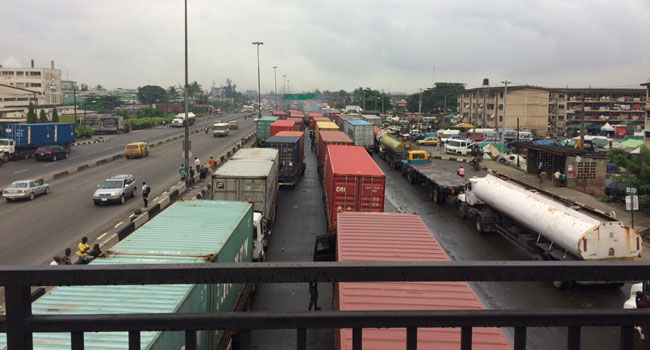News: Lagos Govt Reacts, Wants Closure Of Third Mainland Bridge Postponed

The Lagos State Government has sympathised with residents and commuters of Apapa-Oshodi and other parts of Lagos affected by the lingering gridlock caused by the congestion of trucks and articulated vehicles along the area.
The state government has asked the Federal Ministry of Works, Power and Housing to consider shifting the proposed closure dates for the Third Mainland Bridge to a later date.
In a statement issued on Thursday by the State’s Commissioner for Information and Strategy, Mr. Kehinde Bamigbetan, the move is to avoid compounding the traffic situation in the state.
The commissioner expressed sadness over the difficulties faced by motorists and commuters seeking the use of the Apapa-Oshodi highway and other routes leading to the ports.
He blamed the renewed congestion on the recalcitrance of owners and drivers of tankers and trucks to fully comply with the subsisting directive that restricts their movement within the State.
He linked the situation to the ongoing industrial action by a section of workers at the Apapa ports which has slowed down the pace of goods clearance as well as the slow pace of repair works on the roads leading to the ports, most of which are federal roads.
He explained that the State Police Command and the Lagos State Traffic Management Authority (LASTMA) have been directed to flood the affected areas with sufficient officers to further control traffic and bring sanity to bear “on this hectic situation so as to bring immediate succour to our people.”
The Commissioner said, that “the State Government would urge the and others leading in and out of the ports are experiencing an unusual, albeit, temporary traffic snarl.
“It is indeed pathetic that private firms seeking to make a profit from legitimate commerce would continue to subject the citizens of Lagos State to horrendous pains inspite of the provision of holding bays for their trucks and tankers until it is their turn to pick goods at the ports,”.
He added that the recent rehabilitation of the truck parked at Orile Iganmu, with the capacity to take 3,000 trucks shows the commitment of the Akinwunmi Ambode administration to find a lasting solution to the enormous challenge posed by the indiscriminate use of the highways by articulated vehicles.
According to the Commissioner, the government had hoped that, with the unfortunate loss of lives and property to destruction caused by tanker explosions and truck mishaps, the conscience of the haulage stakeholders would be pricked sorely enough to save Lagosians from the threat of carnage on the highways by adhering to directives and also investing in truck terminals themselves.
He, however, noted that the State Government would not allow its highways turned to death traps while urging speedy delivery of the roads under reconstruction within the axis and full computerisation of the port’s operations in order to save the State from this incessant but avoidable hardship.
“If the powers of the State is inadequate to force these powerful merchants to obey the law, shall we also say that the Federal Government with all the forces at its command, is unable to protect residents of Lagos against this common threat?”
He called on Lagosians to exercise patience, noting that President Muhammadu Buhari had assured Lagos State that the Federal Government would tackle this matter decisively, the latest hardship makes the much-needed intervention extremely imperative.
The Commissioner expressed regrets that ongoing rehabilitation of roads in Apapa and its environs and the efforts towards sanitizing truck entry procedures have pushed the trucks to other parts of the city all because the haulage operators have continued to illegally turn major roads to parks thereby using public facilities to increase their private profit.
“We therefore once again call on the Federal Government to save Lagosians by assisting to enforce the rule that all haulage operators must have designated parks immediately, while we continue to solicit the understanding and cooperation of the general public.”









Post a Comment